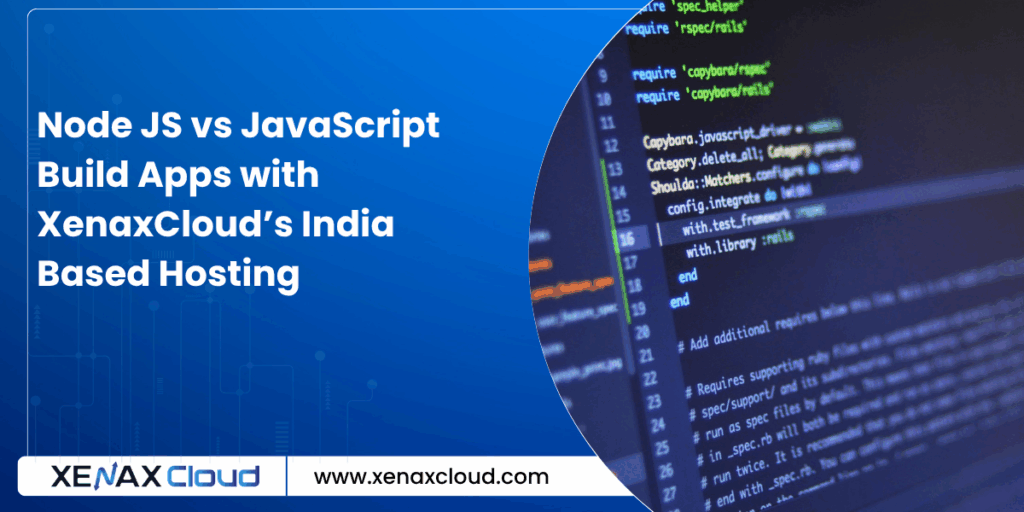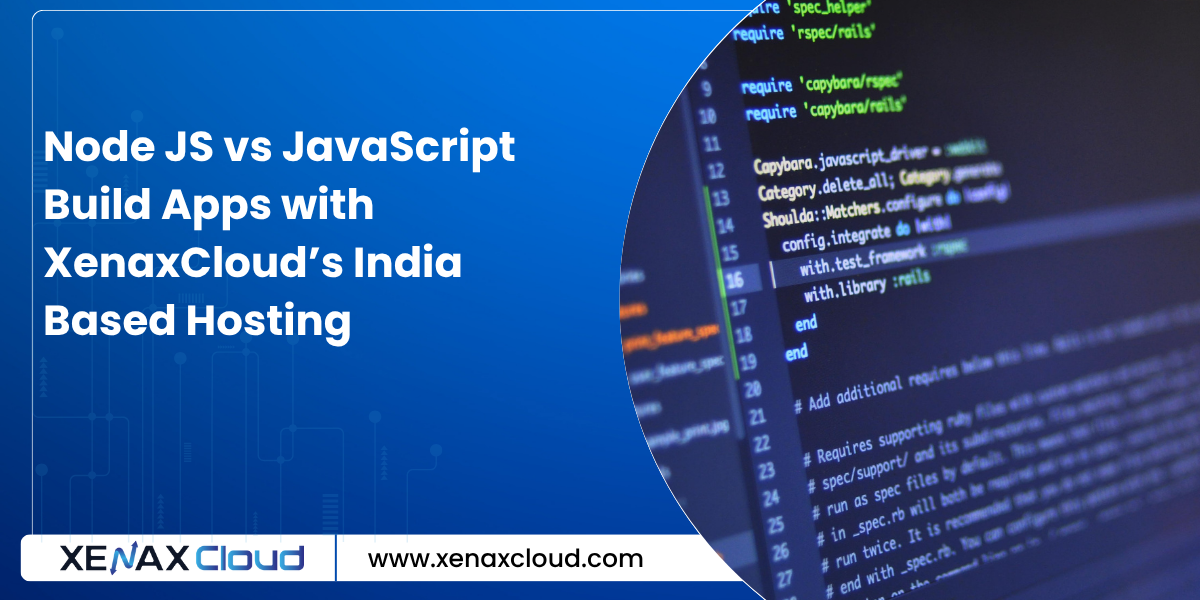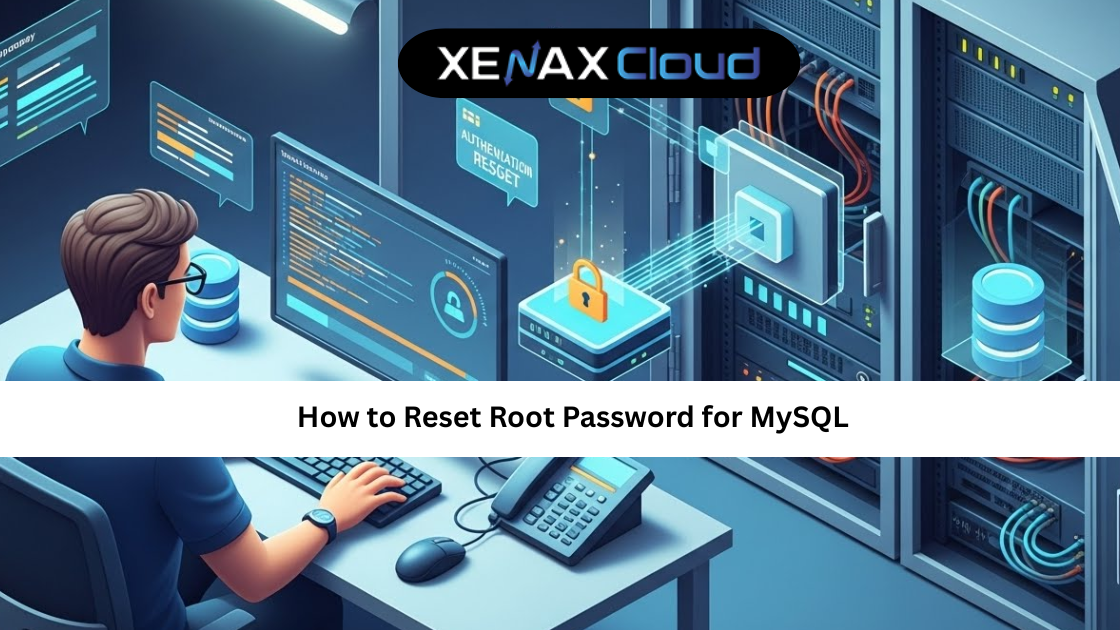Understanding node js vs javascript is crucial for developers choosing the right technology for their projects. The difference between js and nodejs lies in their scope and application, impacting how you host and deploy apps. XenaxCloud, with its India-based data center, offers powerful hosting solutions through its VPS Server, Shared Hosting, Indian RDP, Dedicated Servers, Domains, and Reseller Hosting. This guide explores nodejs vs js, explains how to deploy Node.js applications on XenaxCloud’s VPS Server, and highlights why it’s ideal for web hosting India with a 99.5% uptime guarantee.
Node JS vs JavaScript: Key Differences
What Is JavaScript?
JavaScript (JS) is a client-side scripting language primarily used for creating interactive web pages in browsers. Key features include:
- Browser-Based: Runs in browsers like Chrome, Firefox, and Safari.
- Frontend Focus: Powers dynamic UI elements (e.g., forms, animations).
- Event-Driven: Responds to user actions like clicks and inputs.
- Lightweight: Ideal for small-scale scripts.
JavaScript can be hosted on XenaxCloud’s Shared Hosting for static websites.
What Is Node.js?
Node.js is a server-side runtime environment built on Chrome’s V8 engine, allowing JavaScript to run outside browsers. Key features include:
- Server-Side Execution: Runs JavaScript on servers for backend development.
- Asynchronous: Handles multiple requests efficiently.
- Scalable: Ideal for real-time apps (e.g., chat, streaming).
- Extensive Ecosystem: Uses npm for thousands of packages.
Node.js applications thrive on XenaxCloud’s VPS Server for scalability.
Difference Between JS and NodeJS
The difference between js and nodejs lies in their environment and use cases:
- Environment: JavaScript runs in browsers; Node.js runs on servers.
- Use Case: JavaScript for frontend; Node.js for backend and full-stack.
- Performance: Node.js handles server-side concurrency better.
- Modules: Node.js uses npm; JavaScript relies on browser APIs.
XenaxCloud’s VPS Server supports both nodejs vs js applications.
Comparison Table: Node JS vs JavaScript
| Feature | JavaScript | Node.js |
|---|---|---|
| Environment | Browser | Server |
| Primary Use | Frontend | Backend/Full-stack |
| Performance | Single-threaded | Asynchronous |
| Ecosystem | Browser APIs | npm packages |
| Hosting Needs | Shared Hosting | VPS/Dedicated |
XenaxCloud’s VPS Server is optimized for Node.js applications.
Why Choose XenaxCloud for Hosting Node.js and JavaScript Apps?
XenaxCloud supports node js vs javascript development with:
- High-Performance Hosting: VPS Server for Node.js apps, Shared Hosting for JavaScript.
- India-Based Data Center: Low latency for Indian users.
- Scalability: Upgrade to Dedicated Servers for high-traffic apps.
- Security: Free SSL and DDoS protection.
- 99.5% Uptime: Reliable for production apps.
- 24/7 Support: Assistance in Hindi, English, and other Indian languages.
Web Hosting India: Cost Breakdown
When planning nodejs vs js projects, consider these hosting options:
- Shared Hosting: ₹100–₹500/month, ideal for JavaScript-based static sites.
- VPS Hosting: ₹1000–₹5000/month, perfect for Node.js apps.
- Dedicated Servers: ₹5000–₹20,000/month, for high-performance apps.
- Reseller Hosting: ₹1000–₹5000/month, for hosting businesses.
XenaxCloud’s VPS Server starts at ₹1000/month, ideal for web hosting India.
How to Deploy Node.js and JavaScript Apps with XenaxCloud
Follow these steps to set up a Node.js or JavaScript application on XenaxCloud’s VPS Server.
Step 1: Choose a Hosting Plan
XenaxCloud’s VPS Server is ideal for Node.js:
- Starter VPS: ₹1000/month, 2 GB RAM, 50 GB SSD, root access.
- Pro VPS: ₹3000/month, 4 GB RAM, 100 GB SSD.
- Enterprise VPS: ₹5000/month, 8 GB RAM, 200 GB SSD.
For JavaScript static sites, use Shared Hosting:
- Basic Plan: ₹100/month, 5 GB SSD, 1 website.
- Pro Plan: ₹300/month, 20 GB SSD, unlimited websites.
Step 2: Register a Domain
- Select a Domain: Choose a .in domain via Domains (₹500–₹2000/year) for local SEO.
- Configure DNS: Point to XenaxCloud’s name servers or VPS IP.
- Verify Resolution: Ensure your domain connects to your VPS Server.
Step 3: Set Up VPS for Node.js
- Choose an OS: Select Ubuntu for your VPS Server.
- Access VPS:
- Use Indian RDP for GUI management.
- Connect via SSH:
ssh user@your-vps-ip
- Update System:
sudo apt update && sudo apt upgrade -y - Install Node.js:
- Install Node.js and npm:
sudo apt install nodejs npm -y node -v npm -v
- Install Node.js and npm:
- Set Up a Node.js Application:
- Create a project directory:
mkdir myapp cd myapp npm init -y - Install Express:
npm install express - Create
index.js:const express = require('express'); const app = express(); app.get('/', (req, res) => { res.send('Hello from XenaxCloud Node.js App!'); }); app.listen(3000, () => { console.log('Server running on port 3000'); }); - Start the app:
node index.js
- Create a project directory:
- Install PM2 for Process Management:
sudo npm install -g pm2 pm2 start index.js pm2 startup pm2 save
Step 4: Set Up Nginx as a Reverse Proxy
- Install Nginx:
sudo apt install nginx -y sudo systemctl enable nginx - Configure Nginx:
- Create
/etc/nginx/sites-available/yourdomain:server { listen 80; server_name yourdomain.com www.yourdomain.com; location / { proxy_pass http://localhost:3000; proxy_http_version 1.1; proxy_set_header Upgrade $http_upgrade; proxy_set_header Connection 'upgrade'; proxy_set_header Host $host; proxy_cache_bypass $http_upgrade; } } - Enable and reload:
sudo ln -s /etc/nginx/sites-available/yourdomain /etc/nginx/sites-enabled/ sudo nginx -t sudo systemctl reload nginx
- Create
- Test Application:
- Visit
http://yourdomain.comto see your Node.js app.
- Visit
Step 5: Deploy a JavaScript Static Site (Optional)
For JavaScript-based static sites on Shared Hosting:
- Access cPanel:
- Log in to cPanel via Shared Hosting.
- Upload Files:
- Go to File Manager > public_html.
- Upload
index.html:<!DOCTYPE html> <html> <head> <title>XenaxCloud JavaScript Site</title> <script> alert('Welcome to XenaxCloud!'); </script> </head> <body> <h1>JavaScript-Powered Site</h1> <p>Hosted by XenaxCloud</p> </body> </html>
- Test Site:
- Visit
yourdomain.comto confirm it’s live.
- Visit
Step 6: Enable SSL for Security
- Install Certbot (VPS):
sudo apt install certbot python3-certbot-nginx -y - Obtain SSL Certificate:
sudo certbot --nginx -d yourdomain.com -d www.yourdomain.com - Use XenaxCloud’s Free SSL:
- Enable via cPanel for Shared Hosting or control panel for VPS Server.
- Verify HTTPS:
- Visit
https://yourdomain.comto confirm secure access.
- Visit
Step 7: Secure Your VPS
- Enable Firewall:
sudo ufw allow 22 sudo ufw allow 80 sudo ufw allow 443 sudo ufw enable - Secure SSH:
- Generate SSH keys:
ssh-keygen -t rsa ssh-copy-id user@your-vps-ip - Disable password authentication:
sudo nano /etc/ssh/sshd_config # Set: PasswordAuthentication no sudo systemctl restart sshd
- Generate SSH keys:
- Disable Root Login:
sudo nano /etc/ssh/sshd_config # Set: PermitRootLogin no sudo systemctl restart sshd
Step 8: Monitor and Optimize
- Monitor Performance:
- Install
htop:sudo apt install htop -y
- Install
- Optimize Node.js:
- Use PM2 for process management.
- Enable caching in Nginx:
location ~* \.(jpg|jpeg|png|gif|ico|css|js)$ { expires 30d; } - Reload Nginx:
sudo systemctl reload nginx
- Set Up Backups:
- Use XenaxCloud’s automated backup tools.
- Manual backup:
tar -czf app-backup.tar.gz /home/user/myapp
- Ensure Uptime: XenaxCloud’s 99.5% uptime ensures reliable app performance.
Step 9: Manage with Indian RDP
- Install Desktop Environment:
sudo apt install xfce4 xfce4-goodies xrdp -y sudo systemctl enable xrdp - Connect via RDP:
- Use Indian RDP to manage your VPS Server via GUI.
Step 10: Scale Your Application
- Upgrade to Dedicated Servers for high-traffic Node.js apps.
- Start a hosting business with Reseller Hosting.
Why Choose XenaxCloud for Node.js and JavaScript?
XenaxCloud’s VPS Server excels for node js vs javascript:
- Optimized for Node.js: High-performance servers for nodejs vs js apps.
- India-Based Data Center: Low latency for Indian developers.
- Affordable Pricing: VPS from ₹1000/month, shared hosting from ₹100/month.
- Free SSL: Secures your applications.
- 99.5% Uptime: Reliable for production environments.
- 24/7 Support: Expert help in multiple Indian languages.
Comparison with Other Hosting Types
- Shared Hosting: Ideal for JavaScript static sites, limited for Node.js.
- VPS Hosting: Perfect for scalable Node.js applications.
- Dedicated Servers: High-performance for large-scale apps.
- Reseller Hosting: For reselling hosting services.
XenaxCloud’s VPS Server balances performance and affordability for web hosting India.
Benefits of XenaxCloud’s India-Based Hosting
XenaxCloud’s India-based data center enhances node js vs javascript development:
- Low Latency: Fast performance for Indian users, boosting UX and SEO.
- Data Compliance: Adheres to India’s regulations.
- Local Support: 24/7 assistance in Hindi, English, and other languages.
- Affordable Pricing: VPS from ₹1000/month, domains from ₹500/year.
- Security: Free SSL and DDoS protection.
Additional XenaxCloud Services
- Shared Hosting: Budget-friendly for JavaScript sites, starting at ₹100/month.
- Indian RDP: Secure GUI management for Node.js servers.
- Dedicated Servers: High-performance for large-scale apps.
- Domains: Affordable .in domains for local branding.
- Reseller Hosting: Start a hosting business with ease.
Tips to Optimize Node.js and JavaScript Apps
- Choose the Right Hosting: Use VPS Server for Node.js, Shared Hosting for JavaScript.
- Optimize Performance: Use PM2 for Node.js and caching for JavaScript.
- Secure Your App: Enable SSL and firewalls.
- Regular Backups: Protect code with XenaxCloud’s tools.
- Use RDP: Manage servers via Indian RDP.
Common Use Cases
- Developers: Build Node.js APIs on VPS Server.
- Startups: Host JavaScript sites on Shared Hosting.
- E-Commerce: Run Node.js backends for online stores.
- Hosting Providers: Offer services via Reseller Hosting.

FAQs
- What is node js vs javascript?
Node js vs javascript compares JavaScript (browser-based) to Node.js (server-side runtime). XenaxCloud’s VPS Server supports Node.js apps. - What is the difference between js and nodejs?
The difference between js and nodejs is that JavaScript runs in browsers for frontend, while Node.js runs on servers for backend. Use XenaxCloud’s VPS Server for Node.js. - Why choose XenaxCloud for nodejs vs js hosting?
XenaxCloud’s VPS Server offers 99.5% uptime and India-based servers for web hosting India. - What are the benefits of Indian server hosting?
Indian hosting ensures low latency, data compliance, and local support for developers. - Can I manage my Node.js app remotely?
Yes, use Indian RDP for secure management of VPS Server. - Is XenaxCloud’s hosting secure?
Yes, XenaxCloud provides free SSL, DDoS protection, and firewall support for nodejs vs js apps.
Conclusion
Understanding node js vs javascript and the difference between js and nodejs empowers developers to choose the right tools for their projects. XenaxCloud’s VPS Server is perfect for Node.js applications, while Shared Hosting supports JavaScript sites. With an India-based data center, 99.5% uptime, and services like Indian RDP, Dedicated Servers, Domains, and Reseller Hosting, XenaxCloud is the ideal choice for web hosting India. Start building with XenaxCloud’s VPS Server today at XenaxCloud.com!






